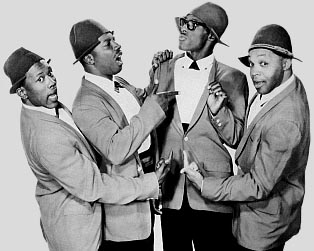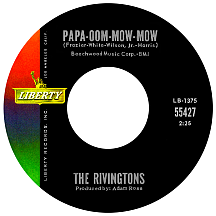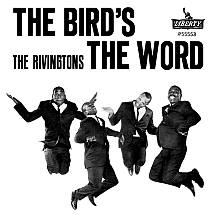THE RIVINGTONS
Papa-Oom-Mow-Mow
So here I go tracking the careers of four singers, each of whom walked (or danced) separate, sometimes overlapping, paths before coming together and finally making their mark with a catchy nonsense song. The Rivingtons even admitted as much in the lyrics ('Funniest sound I ever heard...and I can't understand a single word!') of a collectively-penned 'dit-dit'-ditty called "Papa-Oom-Mow-Mow." Lead Carl Lester White, baritone Al Frazier, tenor John "Sonny" Harris and bass Turner "Rocky" Wilson, Jr. were in a recording studio one night in 1962, warming up in their usual loose, silly manner, when Rocky started playing around with a Marcels "Blue Moon"-style snippet of bass gibberish with the 'papa-oom' in there somewhere. The song was thrown together quickly and recorded at the end of a session, becoming the breakthrough they'd long been striving for...who would'a figured?
Los Angeles native Frazier was the first to pursue a music career, logging time in the late '40s and early '50s with L.A.-based groups The Mello-Moods and The Emanons ("no names" spelled backwards, sort of), though neither act ever made a record. Indianapolis-born singer Thurston Harris was a member of another unrecorded group, The Indiana Wonders, though a move to California made the midwestern moniker meaningless. Frazier joined in 1953 (Willie Ray Rockwell and Matthew Nelson were its other members) when the quartet signed with Syd Nathan's Ohio-based Federal Records as The Lamplighters, backing Jimmy Witherspoon and Johnny Otis's band on a midtempo grinder, "Move Me Baby." The guys waxed 16 sides of their own through '56, enjoying west coast popularity with quirky, creative recordings like Rudy Toombs' "Salty Dog," Harris composition "Goody Good Things" and Otis's "Roll On."
Harris returned to Indiana; Rockwell also left the group, though he recommended two singers to complement Frazier and Nelson. When Texans Carl White and Sonny Harris came on board it changed the quartet's sound significantly, so a new name was decided on; as The Tenderfoots, they turned out four 1955 Federal releases with a straight-ahead R&B sound before reinstating Thurston Harris and continuing as a quintet under the Lamplighters handle. Harris bailed again in late '56, as did Nelson; Floridian Rocky Wilson joined, setting up The Sharps with the lineup that would take them through two decades, what you might call their Rivingtons era. "Come On," issued on both the Jamie and Vik labels, has a tight, rocking sound unlike previous efforts. A solid doo wop rendition of George and Ira Gershwin's "Our Love is Here to Stay" appeared in mid-'57 on Lamp, an Aladdin subsidiary, prior to their first real hit. Thurston Harris had just signed with the label and the Sharps backed him on an infectious cover of Bobby Day's "Little Bitty Pretty One," a fall '57 top ten smash.
One Sharps disc on Aladdin ("What Will I Gain") was followed by another on Combo Records. Then an assertive street corner-style ballad on the Tag label, "Six Months, Three Weeks (Two Days and an Hour)," was picked up by Chess for a spring 1958 invasion of the charts that didn't happen. Studio work for Jamie kept the Sharps going, most notably as the background hand-clappers and hollerers on guitarist Duane Eddy's breakthrough '58 hit "Rebel-'Rouser," after which Eddy returned the favor by twangin' his axe on their recording of "Have Love, Will Travel," a Lee Hazlewood concoction with Coasters/Olympics overtones, foreshadowing the Sharps' own eventual claim-to-fame. "Gig-A-Lene," a Carl White original on Jamie, furthered the group's route to a whimsical trademark sound. Continued session work resulted in a backing gig on Sammy Turner's 1959 single "Sweet Annie Laurie" credited to The Twisters, though the name was never used again.
The lineup of Carl, Al, Sonny and Rocky remained consistent through 1961, though the group's name constantly changed. With producer Kim Fowley, they recorded "When You See Me Hurt" for Brent Records as Carl Lester and the Show Stoppers; as The 4 After 5s on the obscure All Time label they opposed the youthful "we love summer" mindset with "Hello Schoolteacher!," celebrating September's usual back-to-class routine. Then there were a couple of wild Fowley projects on Warner Bros. as The Crenshaws including "Moonlight in Vermont," a distorted take on the Karl Suessdorf-John Blackburn classic from the post-Marcels period when recording acts were hoping to score with madcap remakes of decades-old standards.
The no-hit drought finally came to an end in the spring of '62 under Liberty Records producers Adam Ross and Jack Levy, who rechristened them The Rivingtons after a street in Manhattan where the two had met; this distinctive British-sounding name contrasted the quartet's tendency towards humor, but they figured it was just another temporary thing...right? "Papa-Oom-Mow-Mow" (with writer credit going to all four group members), an undeniably infectious top ten scorcher on Southern California top 40 radio ('Now I hear this sound everywhere I go...on-a records, TV and-a radio...'), unfortunately had less impact in other parts of the country, briefly reaching Billboard's top 50 in September '62. Its flip side, the bluesy "Deep Water," revealed the quartet's desire to stay grounded with at least an occasional serious song. For a moment it appeared there would be no more hits; another oddball novelty, "Kickapoo Joy Juice," fell completely flat. Then "Mama-Oom-Mow-Mow (The Bird)," a more direct imitation, "bubbled under" the Billboard list for a week in January '63 and served as a bridge between its predecessor and the hit that came next.

Teenage dance trends were the rage in the first half of the '60s and the "bird" dance was one of the biggest. The Dells were doing "The (Bossa Nova) Bird" in late '62 around the same time as the Rivingtons' bird-ID'd "Mama-Oom." '63 got under way with "The Bird" by The Dutones and The Dial Tones shouting about the "Chicago Bird." Then the Rivingtons connected with "The Bird's the Word," acknowledging its preexistence ('A-well-a everybody's heard about the bird...') and taking it to the L.A. top ten (as "Papa-Oom" had done), though it struggled (or was ignored) in many other markets. Established "dance queen" Dee Dee Sharp unleashed "Do the Bird," taking it to the top ten in April while the Rivingtons disc settled for a mid-chart placement. Jimmy Norman and the O'Jays cranked out "What's the Word? Do the Bird." Chubby Checker had a related entry, "Birdland," and Inez Foxx, whose top ten hit "Mockingbird" was even further off course, could be suspected of finding inspiration in '63's bevy of bird songs. The Rivingtons followed their hit with a variation, "The Shaky Bird," and an album, Doin' the Bird.
The group toured constantly for a couple of years, enjoying their notoriety on the west coast and in other regions where the songs were popular. "Little Sally Walker" was a minor L.A. hit, but there were no further appearances on national charts. Meanwhile, some guys went berserk in Minneapolis, where Rivingtons records had been passed over. Local band The Trashmen had taken note of the phenomenon, morphing the L.A. group's hits into "Surfin' Bird," a raw, madcap surf-rock jumble; in late 1963 it spent more than two months at number one on the Twin Cities' leading top 40 outlet, KDWB, catching on big nationally and landing in Billboard's top ten in January '64. "Bird Dance Beat," a "part two" of sorts, made the top 30 in March. Later in the year, The Beach Boys helped spread "the word" further when they performed "Papa-Oom-Mow-Mow" onstage in Sacramento; the recording was included on the LP Beach Boys Concert, which hit number one on the album charts in December '64.
The Rivingtons wrapped things up at Liberty with another dance track, "Weejee Walk." Stints with other record companies usually resulted in gimmicky self-penned tracks: "One Monkey (Don't Stop the Show)" for Reprise in '64, "You Move Me Baby" and two others for Vee-Jay in '64 and '65, "Yadi-Yadi-Dum-Dum" and one other for Columbia in '66, "I Don't Want a New Baby" on the Quan label in '67 and "Pop Your Corn," a '69 RCA Victor one-shot. In between those last two, Carl took an unusual lead billing on two singles by Carlos and the Rivingtons. In 1973, Wand Records released "Pa Pa Oom Mow-Mow (1973 Version)," a dance remix of the original recording. By that time, Al Frazier was managing the act; Carl White, Sonny Harris and Rocky Wilson continued with Carl's brother, Madero White, taking Frazier's place. After Carl's sudden death in 1980 at age 47, the remaining Rivingtons kept the 'oom-mow-mow' party going for another decade.



